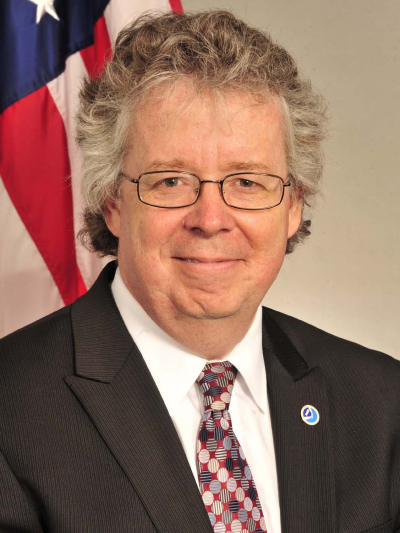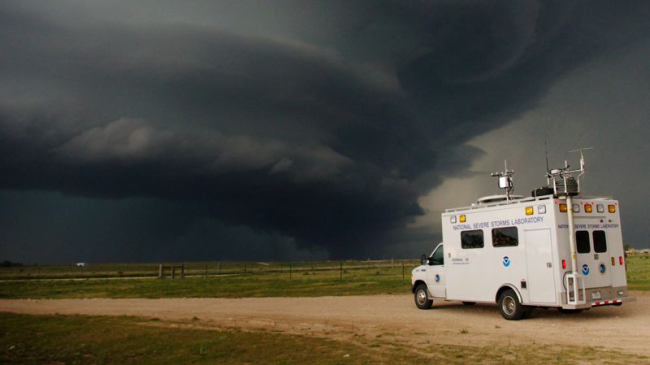NOAA announced today that Dr. Stephen Volz, a top official at NASA and an award-winning aerospace engineer, has been tapped to lead NOAA’s Satellite and Information Service (NESDIS). Volz replaces Mary E. Kicza, who retired earlier this year as the NESDIS assistant administrator. He will assume this new role on November 2.

JPSS-1 is the first in a new series of four highly advanced NOAA polar-orbiting environmental satellites. (Image credit: NOAA)
As assistant administrator, Volz will shepherd NOAA’s programs to build and launch the next generation of environmental satellites: the Joint Polar Satellite System (JPSS) and the Geostationary Operational Environmental Satellite R-Series (GOES-R), and other missions, including the Deep Space Climate Observatory, known as DSCOVR. He’ll also manage NOAA’s current spacecraft fleet and NESDIS’ vast climate, oceanographic and geophysical data operations. Data from these NESDIS assets are used throughout NOAA, across the federal family and around the world for operational weather forecasts and climate impact assessments.

In his current position at NASA, Volz manages all of the agency’s earth science flight missions and associated activities, including 17 satellites currently operating on orbit, 12 in formulation and development, and others in the early study and design stages.
"Our space operation supports critical national needs and is undergoing significant changes both in orbit and on the ground. We were looking for someone that could bring outstanding executive leadership skills and technical expertise to NESDIS. Steve definitely fills that bill," said Dr. Kathryn Sullivan, NOAA administrator. "His NASA experience will be extremely valuable as we work with our partners to develop and bring these new satellites into service, improving the vital environmental intelligence we provide every day."
Before joining NOAA, Volz was the associate director for Flight Programs in the earth science division, NASA science mission directorate. He planned and executed an annual flight program budget of more than $1 billion and directly managed a team of 12 senior managers and collaborated with many senior scientists, engineers, managers and government and industry executives within NASA and in the broader community.
“This is an exciting time for the dedicated personnel at NESDIS. The agency has an incredible mission and one that is going to become even more critical as the demand and need for environmental data increases,” said Volz. “I’m eager to come aboard and join the team.”
"We are thrilled that NOAA has selected one of our top program managers to manage the environmental satellite effort,” said John Grunsfeld, astronaut and associate administrator of NASA’s science mission directorate. “I look forward to working with him in this new role interfacing with NASA's Joint Agency Satellite Division as we both continue to support a weather-ready nation."
While at NASA, Volz was the earth science program executive for a series of earth science missions, including: CloudSat, CALIPSO and ICESat. He led the senior review for the earth science operating missions. Volz worked for NASA’s Goddard Space Flight Center as an instrument manager, a systems engineer and a cryogenic systems engineer on missions and instruments including the Cosmic Background Explorer (COBE). In addition to his government service, Volz worked in the private sector as a project manager and principal engineer at the Ball Aerospace & Technologies Corp., leading the design and development of the Space Infrared Telescope Facility (SIRTF) cryostat system, renamed the Spitzer Space Telescope after launch, among other projects.
Volz is a member of several professional societies, including the American Physical Society, the American Astronomical Society, the American Geophysical Union and the American Meteorological Society. He is a senior member of the Institute of Electrical and Electronics Engineers and an active member of the Geoscience and Remote Sensing Society. He is the recipient of several awards, including from NASA the Silver Snoopy Award (1994) and the Goddard Space Flight Center John Boeckel Award for Engineering Excellence (1992), and the Ball Corporation Award of Excellence (2001).
Dr. Volz earned his Ph.D. in experimental condensed matter physics at the University of Illinois at Urbana-Champaign in 1986, an M.S. in physics from Illinois in 1981 and a B.S in physics from the University of Virginia in 1980. He has more than 20 publications in peer reviewed journals.
NOAA’s mission is to understand and predict changes in the Earth's environment, from the depths of the ocean to the surface of the sun, and to conserve and manage our coastal and marine resources. Join us on Facebook, Twitter, Instagram and our other social media channels.
Contact:
John Leslie
301-713-0214




